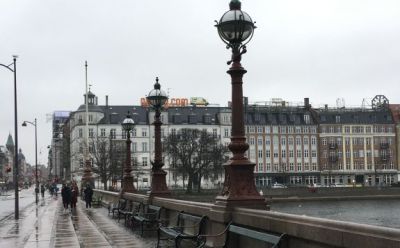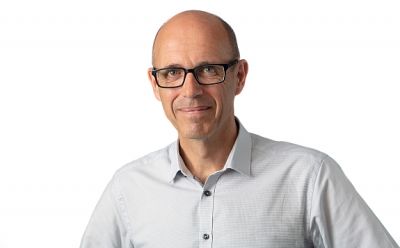Sunday, 28 March, was Teachers’ Day in the Czech Republic, held on the anniversary of the birth of the renowned Czech educational reformer and theologian Jan Amos Komenský (Comenius) in 1592. Do today's teachers still rely on principles laid down by the historic educationalist? And how have they fared during the pandemic? We asked several educators how they saw developments over the last year and where we stand today.
Pražák: All of us feel the same in these tough times
Daniel Pražák, a teacher at ZŠ Stross (an elementary school at Strossmayerovo Square in Prague 7), says the last year has been tough and that some of Comenius’ teachings were as important now as ever.
 “When someone mentions Comenius I always think of a famous quote where he says teachers must not just be a post by the side of the road, showing directions, without themselves moving forwards. I see much of the last year in this context where teachers and other educational personnel did not stay rooted to the spot. It was kind of a sprint: some ran it without too much trouble, others tripped occasionally… and others lost their way temporarily but found their way back. The way we’ve managed would, I think, make Comenius proud.”
“When someone mentions Comenius I always think of a famous quote where he says teachers must not just be a post by the side of the road, showing directions, without themselves moving forwards. I see much of the last year in this context where teachers and other educational personnel did not stay rooted to the spot. It was kind of a sprint: some ran it without too much trouble, others tripped occasionally… and others lost their way temporarily but found their way back. The way we’ve managed would, I think, make Comenius proud.”
In the classroom, Pražák put a lot of stock in group projects but after last spring and the first lockdown, that was largely out of the question. When children returned to the classroom ahead of the second coronavirus wave in the fall, he nevertheless had time to prepare a method of working in groups online, which soon became necessary again in the autumn months.
“While we were able to meet in the classroom we practiced so that we would be able to work together similarly even online. Now they know how to work together over Meets and as a teacher I can visit individual groups. Students are able to rate each other’s work, to give each other compliments or recognition, which they enjoyed, and I think we have made a lot of progress. We managed to transfer a lot of things into the online setting and that has made everyone very happy; even so, we are looking forward to when we can meet face-to-face in the classroom again.
Pražák admits that year one of the pandemic, now well into year two, was not easy and that even teachers who have been superheroes on the internet and have been wonderfully inspiring, also have moments of doubt when it seems impossible to move forward. Everyone, he suggests, has moments when they think they are the “worst teacher” or feel frustrated because of current limitations.
Parents too may have similar feelings of doubt, moments when they are down, and the teacher makes it clear both groups need to cut themselves a little slack, that such feelings of doubt are normal in such trying times.
“It’s hard to keep the same level of performance [as if there was no pandemic]. And that’s okay. People have to take care of themselves and their mental health. Everyone feels the same way in this unusual time,” says Pražák, prolific about education on Twitter, with around 9,000 followers.
Duschinská: Teachers should be optimists “to the core”
 “Comenius was an inspirational figure, who saw education as a journey towards improving the state if things. He saw education not only as knowledge but also as a framework for moral values and religious teaching. Those values and an educative approach remain tremendously inspiring to this day, says Karolina Duschinská, preparing future educators at Charles University’s Faculty of Education. She says that distance learning can be effective.
“Comenius was an inspirational figure, who saw education as a journey towards improving the state if things. He saw education not only as knowledge but also as a framework for moral values and religious teaching. Those values and an educative approach remain tremendously inspiring to this day, says Karolina Duschinská, preparing future educators at Charles University’s Faculty of Education. She says that distance learning can be effective.
“It could be useful for teaching theoretical subjects. A case in point is General Didactics, where you have two or three teachers in one lecture, covering everything from methodological to pedagogical approaches, but also psychological reasoning, findings from pedagogical research, and examples from real life. Students “responded well” is how Duschinská describes her experience with distance learning over the last year or so.
“I think that teachers have to be born optimists, to see the positive side of things: it’s possible to support cooperation between students even in distance learning,” she says. Even though everyone is looking forward to getting together again at school, connections can still be made even now.
Burian - Using orientation to get kids back into sports
Michal Burian teaches Phys. Ed. and science at ZŠ Dědina in Prague 6 and agrees that a Comenian approach can be applied very well online, saying “Where there’s a will, there’s a way.” In natural science there is a lot of emphasis on interactive methods, using different models and videos. Students are also tasked with going outside, for example, to do birdwatching or similar activities.
Burian admits it is a little harder when it comes to gym class, as the burden lies with the student and the teacher cannot be on-hand. Students, he says, themselves have to get up and start moving. He and colleagues, however, have come up with innovative ideas, organising orientation runs in places like Prague’s Hvězda park, for kids to use their smart phones to read QR codes along the course to register their running times. He says it has been fairly successful. Still, he appeals to kids to get outdoors and off the computer when they can: to be active, to go biking with parents, for example, and to do sports as the weather improves.
Horáčková - Connecting through facebook
 Klára Horáčková, who works at the Department of Pedagogy at Charles University’s Faculty of Education, likewise agrees that Comenian principles are still important, perhaps even more during a period when most interaction has moved online. She began using interactive tools even before the pandemic, placing an emphasis on visual material, texts and video in her webinars, while building on students’ earlier education and knowledge. It’s clear that she really wants to bring experience from real life, such as what working with students in an elementary school classroom is like: “I like using a lot of examples of children’s work, to bring as much material as I can, to make an impact on all levels” she says.
Klára Horáčková, who works at the Department of Pedagogy at Charles University’s Faculty of Education, likewise agrees that Comenian principles are still important, perhaps even more during a period when most interaction has moved online. She began using interactive tools even before the pandemic, placing an emphasis on visual material, texts and video in her webinars, while building on students’ earlier education and knowledge. It’s clear that she really wants to bring experience from real life, such as what working with students in an elementary school classroom is like: “I like using a lot of examples of children’s work, to bring as much material as I can, to make an impact on all levels” she says.
It’s important for her that online or distance learning offer a safe place and an opportunity for her university students to meet and to interact: “I try to make it a safe area where students can share their experience and not be afraid to ask questions. That means using groups on something as ordinary even as Messenger on Facebook to bring them together. I get the sense that a lot of students are worried about asking a “dumb” question and I try and motivate them and explain that there is no such thing. On the contrary questions are one way to assess whether she has been getting her message across, the teacher says.


















